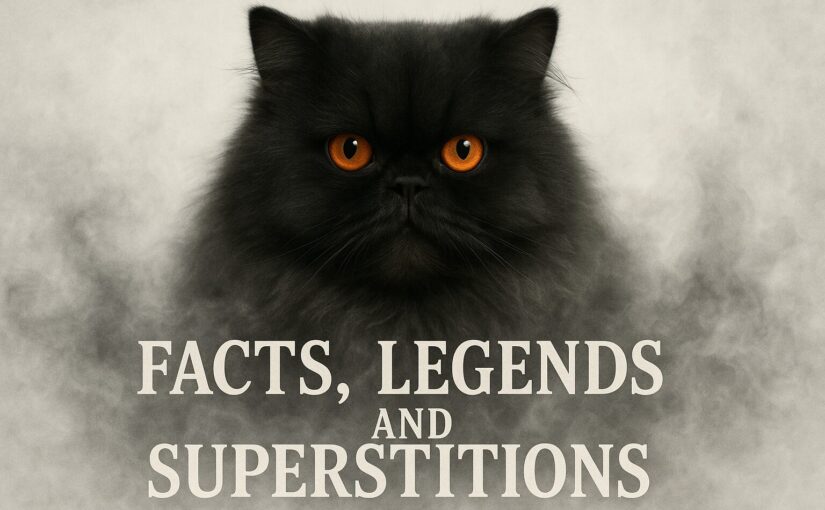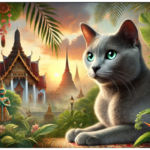Few animals have inspired as much fascination—and unfair suspicion—as the black cat. Sleek, mysterious, and elegant, these shadowy felines have been both revered and reviled throughout history. From ancient Egypt’s temples to modern Halloween décor, black cats have walked the fine line between good fortune and bad luck for centuries.
Let’s dive into the facts, legends, and superstitions surrounding black cats and uncover the truth behind their enduring mystique.
🖤 The Allure of the Black Cat
It’s easy to see why black cats captivate us. Their glossy coats shimmer with iridescent undertones of mahogany or blue, their eyes gleam like topaz or emeralds, and they move with a quiet grace that borders on magical.
There are more than 20 cat breeds that can have solid black coats, including the Bombay, British Shorthair, Maine Coon, and Oriental Shorthair. The Bombay cat, in particular, is famously described as a “miniature panther”—a breed created to embody the mystery and beauty of a black leopard in a domestic cat’s body.
🐈⬛ Ancient Reverence: Black Cats in Early Cultures
In ancient Egypt, all cats were sacred, but black cats held special significance as symbols of Bastet, the goddess of home, fertility, and protection. Killing a cat—even accidentally—was considered a serious crime, punishable by death.
In Japan, black cats were (and still are) thought to bring good luck, especially to single women seeking love. Owning a black cat was believed to attract kind-hearted suitors and ward off evil spirits.
Meanwhile, in Scotland, a black cat appearing on your doorstep was a sign of prosperity on the way. Fishermen’s wives often kept black cats for protection, believing their husbands would return safely from sea.
🌙 The Dark Turn: Europe’s Medieval Superstitions
During the Middle Ages, black cats’ reputation took a sharp downturn. As fear of witchcraft spread through Europe, black cats were often associated with witches and dark magic.
Legends claimed witches could shape-shift into black cats to sneak about unseen—or that cats were their familiars, supernatural companions who helped them cast spells. This superstition crossed the Atlantic with early settlers and sadly led to the persecution of both cats and the women who cared for them.
It’s even believed that the Pilgrims in colonial America avoided black cats**,** considering them omens of evil. Ironically, this fear helped fuel rodent problems in early settlements—a situation cats would have happily remedied.
🍀 Good Luck or Bad? It Depends Where You Live
Whether a black cat is lucky or unlucky depends largely on geography and culture:
- United Kingdom & Ireland: A black cat crossing your path brings good luck.
- United States: The same scenario is often considered bad luck.
- Germany: It depends on direction—crossing left to right is fortunate, right to left is not.
- Japan: A black cat greeting you is a sign of blessings and success.
- France: In parts of southern France, a black cat known as a matagot was thought to bring wealth—as long as it was treated kindly.
So much for universal superstition!
🎃 Black Cats and Halloween
In modern times, black cats are inseparable from Halloween imagery, symbolizing the spooky, the mysterious, and the magical. But for many animal shelters, October can be a worrisome month—there are still lingering myths about black cats being unlucky or used in cruel Halloween pranks.
Thankfully, most shelters now require careful adoption screenings year-round and work hard to promote Black Cat Appreciation Day (August 17) and National Black Cat Day (October 27)—two wonderful opportunities to celebrate these enchanting companions.
🧬 Fun Facts About Black Cats
- Black fur can fade to brown or reddish hues in sunlight due to a pigment called pheomelanin.
- Black cats have a higher resistance to certain diseases, possibly due to the same genetic mutations that make their fur black.
- Their melanism genes are related to camouflage and may offer survival advantages in the wild.
- Despite myths, black cats are just as affectionate, playful, and social as cats of any other color.
❤️ The Modern-Day Comeback
Today, black cats are experiencing a well-deserved reputation revival. Social media accounts like Black Cats of Instagram celebrate their beauty and charm, helping dispel old myths. Many people proudly choose to adopt black cats precisely because they’ve been unfairly overlooked in shelters.
Adopting a black cat doesn’t invite misfortune—it brings home a sleek, loving, and loyal friend who might just steal your heart under the cover of darkness.
🐾 In the End: Celebrate the Shadow
Whether you see them as lucky, mysterious, or simply gorgeous, black cats remind us that beauty and magic often dwell in the shadows. The next time a black cat crosses your path, take it as a sign of something wonderful on its way—perhaps a reminder that good fortune often arrives quietly, on soft velvet paws.






